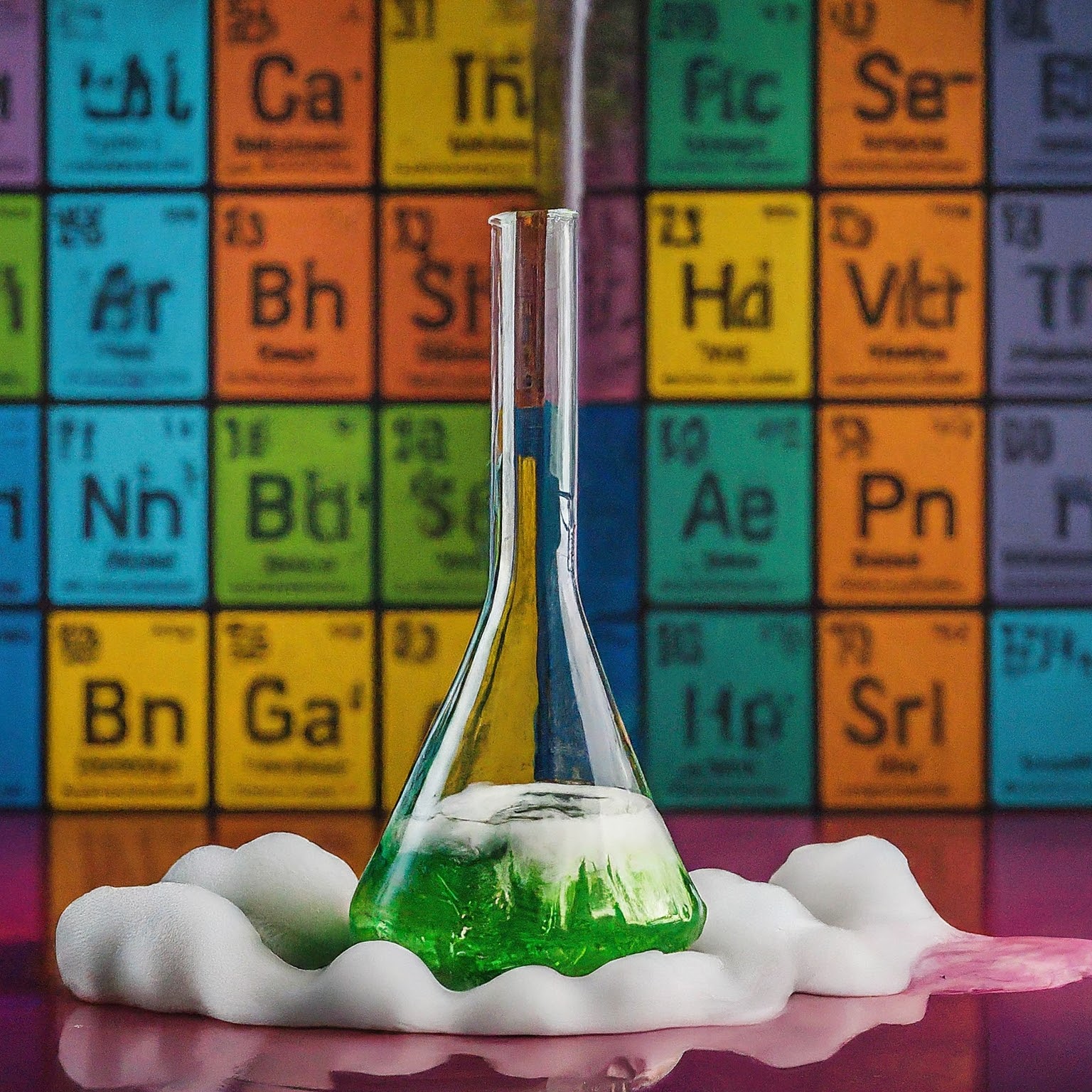Accessing a compilation of 500 Chemistry Questions Part-1 for exam preparation holds immense significance for students. Firstly, it offers a comprehensive review of the subject, covering a wide range of topics likely to be tested. Secondly, practicing such a large number of questions aids in solidifying understanding and retention of key concepts.
Furthermore, it allows students to gauge their proficiency level and identify areas needing further improvement. Ultimately, this extensive practice contributes significantly to enhancing exam readiness and performance.

500 Chemistry Questions Part-1
- Which particles are present in the nucleus of an atom – proton and neutron
- The scientist who discovered ‘Atomic Theory’ – John Dalton
- What is the charge on an electron? (-1.6 x 10-19C)
- Atoms are electrically neutral
- Electron was discovered by – Thomson
- Who discovered proton – Goldstein
- An Indian scientist whose name is associated with a specific fundamental particle – Bose
- Neutron was discovered by – Chadwick
- The chemical behavior of an atom depends on the number of electrons revolving around its nucleus.
- The total energy of an electron revolving in an atom is always positive.
- The international standard of atomic weight is – C-12
- The half-life of a radioactive substance is 4 months. It will take time for three-fourth of this substance to decay – 8 months
- Earth’s age is estimated through uranium dating.
- What is determined by radio carbon dating – age of fossil
- Who invented the atomic bomb – Otto Hahn
- On what principle does a nuclear power plant work – Fission
- Which type of reaction produces the most harmful radiation – Fission reaction
- Energy is emitted from the Sun – through nuclear fusion
- Which substance works as a moderator in a nuclear reactor – heavy water
- The process of fission is responsible for releasing energy in the atomic bomb.
- Cobalt-60 is commonly used in radiation therapy because it emits – gamma rays.
- On what principle does the hydrogen bomb work – uncontrolled fusion reaction
- The half-life of a radioactive substance is 10 days. This means that 3/4th of the substance will be decomposed in 20 days.
- A radioactive element of which large reserves are found in India – Thorium
- The fuel in Kalpakkam’s fast breeder reactor is – enriched uranium.
- Carbon dating is used to determine the age of – fossil
- The difference between isotopes of an element is due to the presence of different numbers of – neutrons
- An isotope of an atomic nucleus is a nucleus that has the same number of protons, but a different number of neutrons.
- Radioactive isotope of hydrogen is called – Tritium
- What is the number of isotopes of hydrogen – 3
- The largest number of isotopes are found in – Polonium
- The number of isotopes of polonium is – 27
- Isotones have – equal number of neutrons
- Those ions which have the same number of electrons are called – isoelectronic
- By whose emission areosceles are produced – beta rays
- Cobalt-60 is commonly used in radiation therapy for diseases like cancer, because it emits – gamma rays.
- Which radioisotope is used to control blood cancer (leukemia) – Cobalt-60
- Acid is a substance which gives protons.
- What are the main pollutants of cigarette smoke – carbon monoxide and benzene
- In what form do plants take nitrogen – Nitrates
- If the plants found on Earth disappear, then which gas will be lacking – Oxygen
- What is used to test acid and ash – litmus paper
- What is water soluble base called – Alkali
- Who determined the pH value – Sorensen
- What do all acids provide when dissolved in water – H+ ions
- Cow dung gas mainly contains – methane
- L.P.G. Which gas is mainly present in (P.G.) – Butane
- What is the full name of G. – Liquefied Petroleum Gas
- Why is G. called eco-friendly – it has very less carbon monoxide
- Which fuel produces minimum environmental pollution – Hydrogen
- The fuel used to run a rocket is called – Propellant
- Among the different varieties of coal, the percentage of carbon is the highest – Anthracite
- Brown coal is known as – Lignite.
- What type of fire extinguisher is used for petrol fire – Foam type
- Which gas is used in fire fighting – CO2
- Which is the best fuel in terms of energy released per gram of fuel – Hydrogen
- Producer gas is a mixture of – CO+N2
- Which can be used as propellant or fuel in rockets – Liquid Hydrogen + Liquid Oxygen
- Who discovered the catalyst – Berzelium
- Catalytic poison is – action inhibitory
- Bio-Catalyst is – Enzyme
- The catalyst used in hydrogenation of oils is – Ni
- Oxides of nitrogen are used as catalysts in the chamber process.
- Which enzyme converts glucose into alcohol – Zymase
- The heaviest metal is – Osmium
- The lightest metal is – Lithium
- The lightest element is- hydrogen
- The element found in greatest quantity on Earth is – Oxygen.
- Which is a man-made element – California
- Nowadays, yellow lamps are being used extensively in street lighting. What is used in these lamps – Sodium
- The chemical formula of caustic soda is – NaOH
- The chemical formula of baking soda is – NaHCO3.
- Common salt is- sodium chloride
- Who has the maximum contribution in the salinity of sea water – Sodium chloride
- What is table salt made from – strong acid and strong base
- The chemical name of baking soda is – sodium bicarbonate.
- The chemical used as a stabilizer in photography is – Sodium thiosulphate.
- ‘Milk of Magnesia’ is a suspension of magnesium hydroxide.
- Which main raw material is used in the manufacture of rayon – Cellulose
- The reason for the sweet taste of fruits is – Fructose
- Carbohydrate is the compound of – carbon, oxygen and hydrogen
- Drying oils contain large amounts of unsaturated fatty acids.
- Methylated spirit contains only methanol, is the statement correct – No
- By which reaction can amides be converted into amines – Hoffman
- Glycogen, starch and cellulose are polymers of – Glucose
- The metallic component of chlorophyll is – Magnesium Glass is – An elastic solid
- To provide hardness to steel, the amount of chromium is added.
- Which material is most elastic – Steel
- There is a coating on galvanized iron – zinc
- Which process is not beneficial in preventing rusting of ore – Annealing
- By applying which substance the bleeding from the cut site stops – Ferric chloride
- Which metal was used by humans for the first time – Copper
- The maximum permitted concentration of copper in drinking water in mg/L is – 2.0
- When kept in air for some time, a layer of green colored basic carbonate forms on any metal. That metal is – copper.
- The best conductor of electricity is – Copper
- While making gold jewellery, which metal is added to it – Copper
- Slightly blue – copper sulphate
- The gas used in cooking is mainly – methane
- Most explosions in mines occur due to the mixture of methane with air.
- LPG is a mixture of – butane and propane
- Which gas was used as a chemical weapon in the First World War – Mustard gas
- Why diesel is used in heavy vehicles – high efficiency and economic savings
- Indane gas is a mixture of butane and propane.
- Commercial Vaseline is extracted from – Petroleum
- Paraffin is a by-product of petroleum refining.
- What is the main component of petrol – octane
- Gasohol, which is used as fuel in motor vehicles, is a mixture of petrol and alcohol.
- The wax obtained from petroleum is – Paraffin wax
- In which only one type of atom is found – natural element
- What is air – mixture
- Ammonia is a chemical compound.
- Diamond is – Element
- Water is a compound because it consists of two different elements joined by chemical bonds.
- Mixture is formed by mixing two or more pure substances in any ratio.
- Such elements which have properties of both metals and non-metals are called metalloids.
- Bleaching powder is – compound
- Gunpowder is – mixture
- Which gas is used in welding metal – Acetylene
- Refrigerant is Freon – Difluoro dichloro methane.
